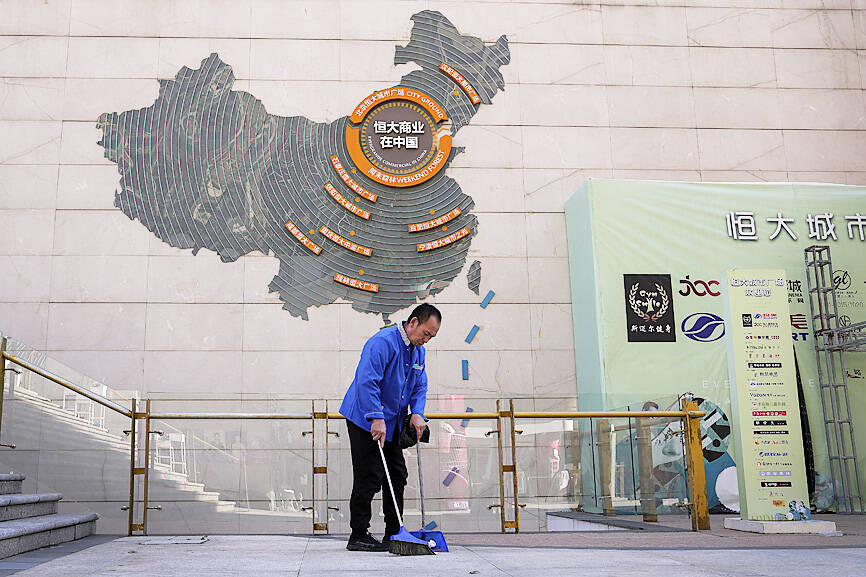China Evergrande Group (恆大集團), once among China’s biggest developers and now a poster child for its property crisis, laid out details of a multibillion-dollar restructuring plan that calls for its offshore creditors to swap their debt for new securities.
The proposal, released on Wednesday and coming 15 months after Evergrande first defaulted on its public US dollar bonds, addresses debt tied to Evergrande, its Scenery Journey Ltd (景程) unit and offshore financing arm Tianji Holding Ltd (天基控股).
Evergrande credit investors can receive new notes maturing in 10 to 12 years or a combination of new debt and instruments tied to the shares of Evergrande’s property-services unit, its electric-vehicle division or the builder itself, the company said in a Hong Kong Stock Exchange filing.

Photo: AP
Scenery Journey creditors are slated to get US$6.5 billion of new bonds, while Tianji investors are to receive US$800 million of new notes.
For the first two-and-a-half years, interest on the new bonds can be paid in cash or in kind, meaning with more debt.
“The plan is not perfect,” but rather a compromise and “better than nothing,” said Meng Ting (孟婷), a senior credit strategist at Australia and New Zealand Banking Group Ltd.
More broadly, the terms “could make investors more cautious when investing in distressed developers,” Meng said.
Evergrande said the debt restructuring would allow it to focus on returning to normal operations. That would require additional financing of 250 billion to 300 billion yuan (US$36.6 billion to US$44 billion) to “ensure delivery of properties,” the company said.
Tianji would require an estimated 1 billion to 2 billion yuan.
Meanwhile, Evergrande said that its electric-vehicle business faces “the risk of shutdown” in the absence of new funding. The operation has taken steps to cut costs, including cutting its workforce by one-quarter in the past nine months.
“It’s very hard to estimate the equity value” of the two Evergrande units given trading of their shares has been suspended for a year, said Eddie Chia, portfolio manager at China Life Franklin Asset Management Co (中國人壽富蘭克林資產管理). “The equity could be worthless.”
The debt restructuring is to be implemented through schemes of arrangement or other proceedings that might take place in courts in the Cayman Islands, Hong Kong and the British Virgin Islands, the developer said.
Such procedures typically require approval from at least 75 percent of creditors in value.
Evergrande bondholders would have about US$31.7 billion in outstanding principal as of the restructuring’s effective date, which the company estimates would be in October.
The ultimate recoveries would depend on the performance of the securities that bondholders choose.
If the restructuring is not successful and Evergrande liquidates, unsecured offshore debtholders would recover about 9.73 billion yuan, the company said. That means noteholders would stand to recover 2.05 percent to 9.34 percent, depending on what securities they hold.
Based on that liquidity value, “Evergrande’s plan is much better than expected, which was quite low,” said Xu Liqiang, portfolio manager at Shanghai Silver Leaf Investment Co (上海銀葉投資).
Still, “the chance for Evergrande to pay off its debt in 12 years is low. To achieve that, the onshore housing market will have to prosper for more than 10 years consecutively,” Xu said.

To many, Tatu City on the outskirts of Nairobi looks like a success. The first city entirely built by a private company to be operational in east Africa, with about 25,000 people living and working there, it accounts for about two-thirds of all foreign investment in Kenya. Its low-tax status has attracted more than 100 businesses including Heineken, coffee brand Dormans, and the biggest call-center and cold-chain transport firms in the region. However, to some local politicians, Tatu City has looked more like a target for extortion. A parade of governors have demanded land worth millions of dollars in exchange

Hong Kong authorities ramped up sales of the local dollar as the greenback’s slide threatened the foreign-exchange peg. The Hong Kong Monetary Authority (HKMA) sold a record HK$60.5 billion (US$7.8 billion) of the city’s currency, according to an alert sent on its Bloomberg page yesterday in Asia, after it tested the upper end of its trading band. That added to the HK$56.1 billion of sales versus the greenback since Friday. The rapid intervention signals efforts from the city’s authorities to limit the local currency’s moves within its HK$7.75 to HK$7.85 per US dollar trading band. Heavy sales of the local dollar by

Taiwan Semiconductor Manufacturing Co’s (TSMC, 台積電) revenue jumped 48 percent last month, underscoring how electronics firms scrambled to acquire essential components before global tariffs took effect. The main chipmaker for Apple Inc and Nvidia Corp reported monthly sales of NT$349.6 billion (US$11.6 billion). That compares with the average analysts’ estimate for a 38 percent rise in second-quarter revenue. US President Donald Trump’s trade war is prompting economists to retool GDP forecasts worldwide, casting doubt over the outlook for everything from iPhone demand to computing and datacenter construction. However, TSMC — a barometer for global tech spending given its central role in the

An Indonesian animated movie is smashing regional box office records and could be set for wider success as it prepares to open beyond the Southeast Asian archipelago’s silver screens. Jumbo — a film based on the adventures of main character, Don, a large orphaned Indonesian boy facing bullying at school — last month became the highest-grossing Southeast Asian animated film, raking in more than US$8 million. Released at the end of March to coincide with the Eid holidays after the Islamic fasting month of Ramadan, the movie has hit 8 million ticket sales, the third-highest in Indonesian cinema history, Film